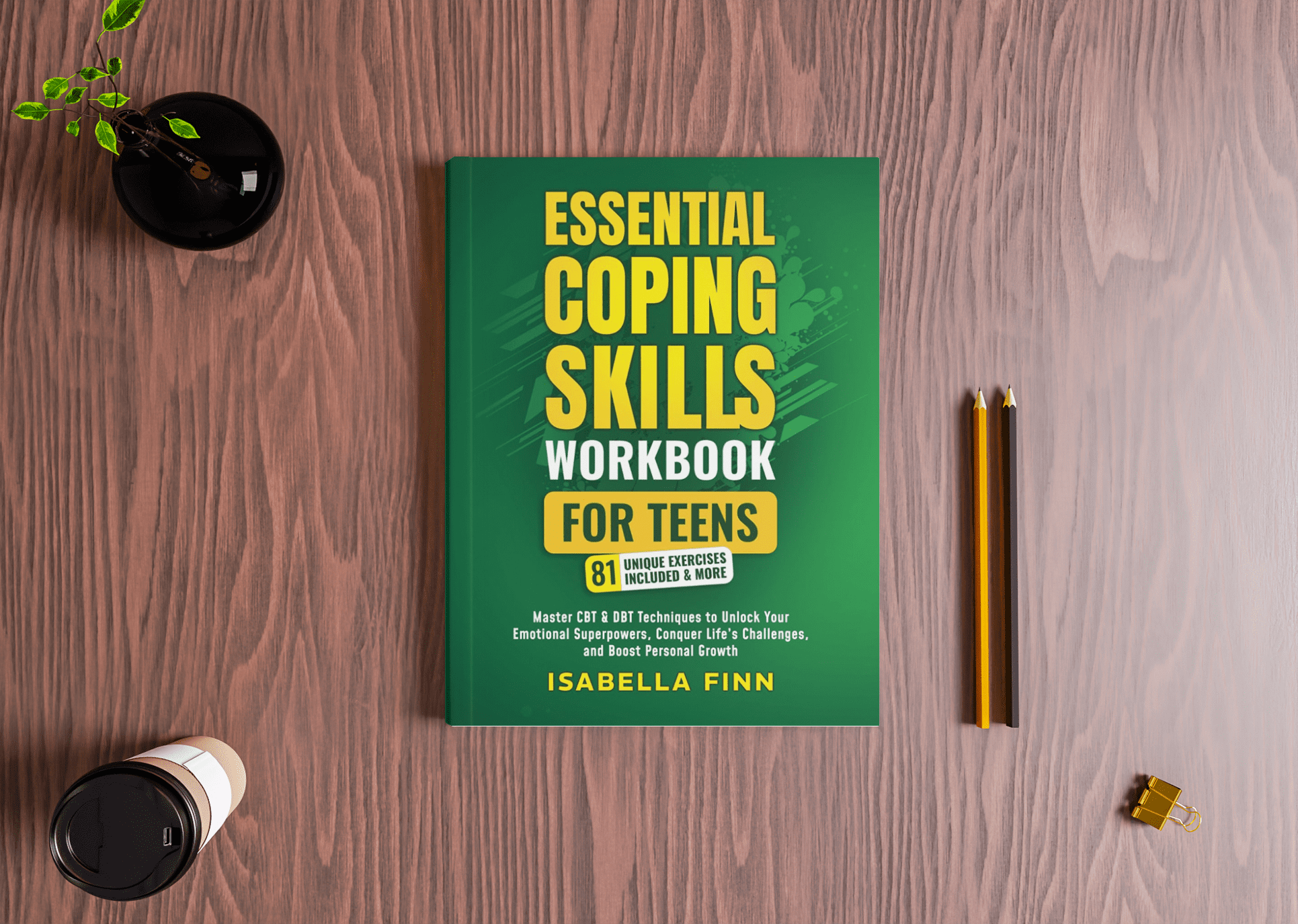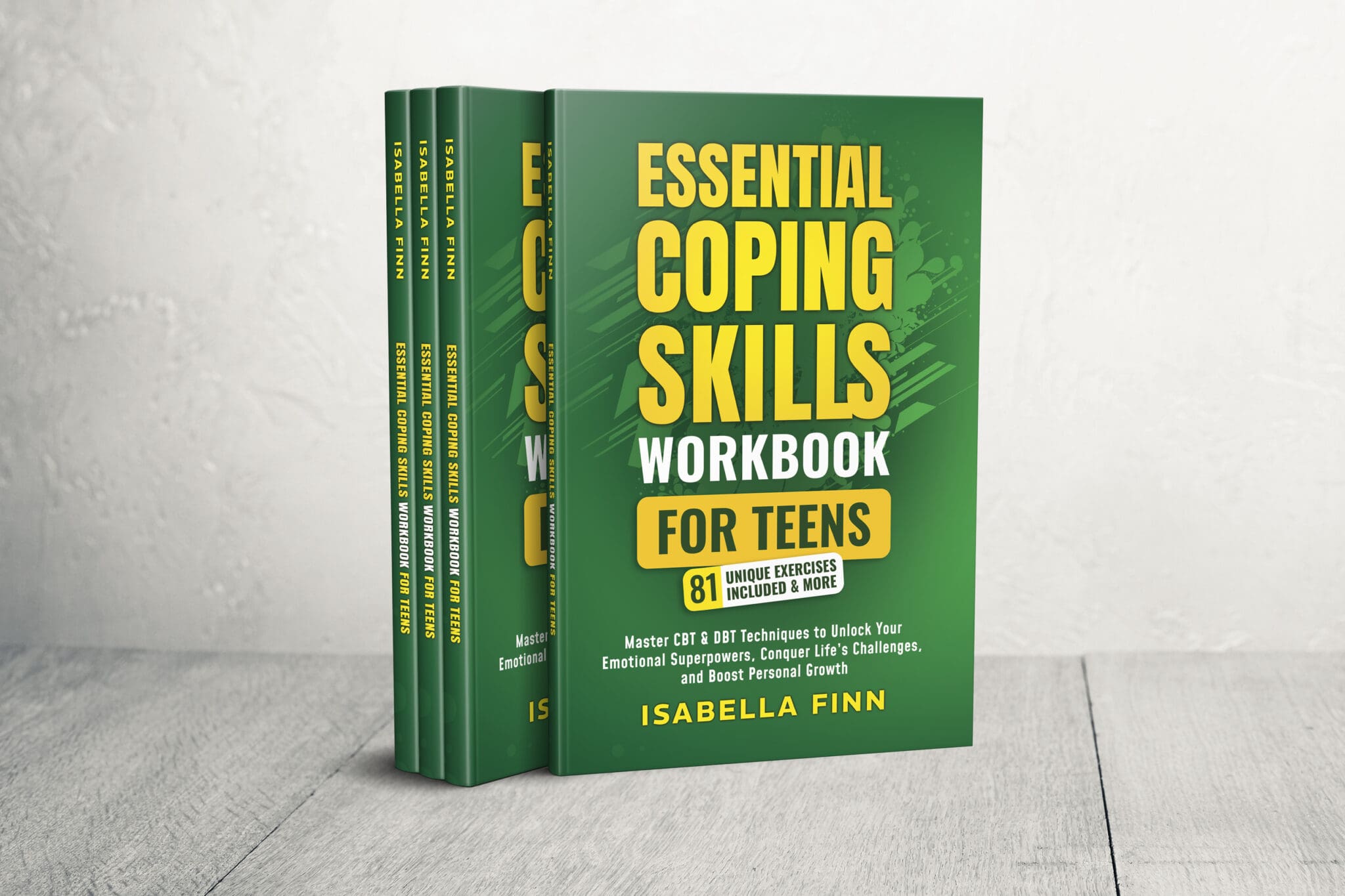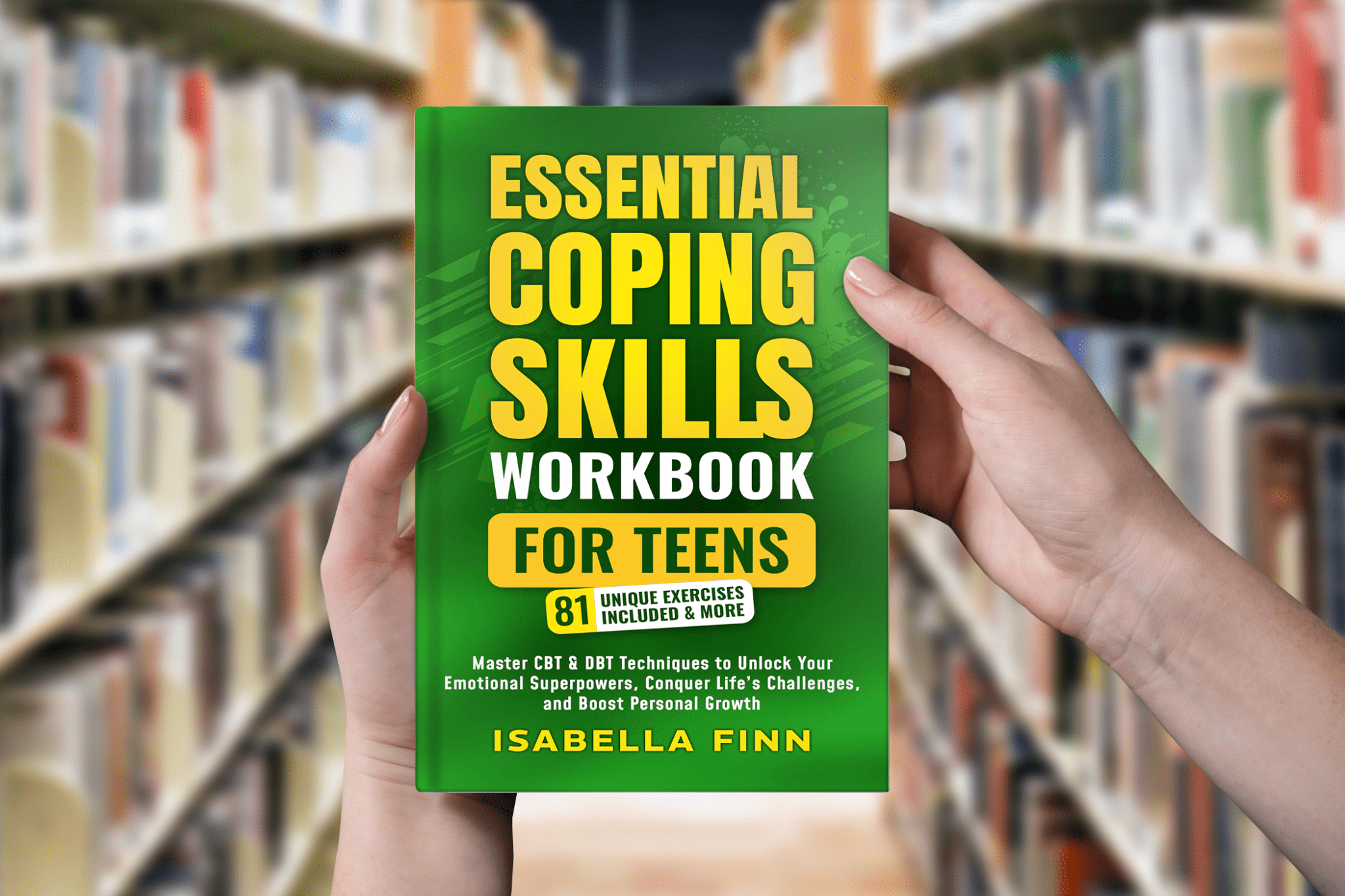Full Disclosure: Clicking on these links could mean a tiny commission for me, at no extra cost to you.
During the wild ride of adolescence, teenagers face a whirlwind of emotions, changes, and hurdles that can feel like a tidal wave if they’re not equipped with the right tools. Whether it’s the stress of schoolwork or the constant flux of social dynamics, the teen years are packed with challenges that put their mental well-being and strength to the test. The good news: there’s a whole toolbox of coping skills for teens that can help them navigate stress, conquer obstacles, and come out even stronger on the other side.
advertisement
Start Treatment for Your Teen Today
Teen Counseling offers expert online therapy to help them navigate their challenges and thrive. Connect with a licensed therapist today and give your teen the support they need. Don’t wait – help is just a click away! .
Free AssessmentUnderstanding Stress and Its Impact on Teens
Ah, the rollercoaster ride of adolescence! It’s a period of massive transformation and development, but it also tends to come with a side of extra stress. Knowing what’s causing all that tension and how it shows up can give teens (and us grown-ups too) the power to tackle it head-on. Let’s dive into the usual suspects when it comes to teen stress and explore how it can take a toll on them, both inside and out.
- Academic pressure: Heavy workloads, exams, and expectations to excel in school can create significant stress for teens. The fear of not meeting expectations – whether their own, their parents’, or those of educational institutions – can lead to chronic stress.
- Peer pressure: The desire to fit in and be accepted by peers can lead to stress, especially when it involves risky behaviors or conflicts with personal values. Issues such as bullying, peer pressure, and the quest for social acceptance can all take a toll on a teen’s mental health.
- Social media: Comparison with peers on social media platforms can contribute to feelings of inadequacy, loneliness, and anxiety about one’s self-image.
- Family issues: Conflict with parents or siblings, parental expectations, divorce, or family financial struggles can all cause stress for teens.
- Romantic relationships: Navigating romantic relationships for the first time can be emotionally challenging and stressful for teens.
- Bullying: Experiencing bullying, whether in person or online, can have serious negative effects on a teen’s mental health and well-being.
- Body image concerns: Pressure to conform to societal beauty standards and dissatisfaction with one’s appearance can lead to stress and low self-esteem.
- Future uncertainty: Concerns about college, career paths, and the future can be overwhelming for teens, especially as they approach graduation.
- Health issues: Chronic illnesses, mental health disorders, or physical disabilities can create additional stress for teens as they cope with the challenges of managing their health.
- Socioeconomic factors: Teens from low-income households may experience stress related to financial instability, lack of access to resources, or housing insecurity.
It’s important for parents, educators, and communities to recognize these stressors and provide support and resources to help teens effectively cope with them. This can include encouraging open communication, promoting healthy coping mechanisms, and encouraging self-care practices.
Physical and Emotional Symptoms of Stress
Stress can manifest in various physical and emotional symptoms, affecting teens’ overall health and ability to function effectively. Recognizing these signs is the first step towards managing stress.
- Physical Symptoms: These may include headaches, stomachaches, fatigue, and changes in sleeping or eating patterns. Stress can also weaken the immune system, making teens more susceptible to illnesses.
- Emotional Symptoms: Stress can lead to feelings of anxiety, irritability, depression, and overwhelm. It might also cause difficulty concentrating, making decisions, or remembering things.
It’s important to grasp these stressors and their signs so we can create coping methods for teens that tackle both the root issues and their impacts. When teens can pinpoint what’s setting off their stress and spot how it’s showing up, they’re already on the path to handling it in positive, constructive ways.
The Foundation of Coping Skills
When we’re faced with tough times, how we handle them can make all the difference in how we feel. For teenagers, learning how to deal with stress isn’t just about getting through those rocky moments of growing up; it’s about setting themselves up for a strong future. Coping methods come in two main categories: ones that help fix the problem, and ones that help deal with the feelings it brings up. Knowing about these can help teens figure out what to do when things get tough.
Types of Coping Mechanisms
Coping methods can be broadly categorized into several types, each serving different purposes and approaches to dealing with stress. Here are some common types:
- Problem-solving coping: This involves actively addressing and resolving the source of stress. Teens using this approach may brainstorm solutions, make plans, or take action to change the situation causing their stress.
- Emotion-focused coping: This involves managing the emotions associated with stress rather than directly addressing the problem itself. Teens may use techniques such as relaxation exercises, mindfulness, or seeking social support to cope with their feelings.
- Social coping: This involves seeking support from friends, family, or other trusted individuals. Talking to others, seeking advice, or simply spending time with supportive people can help teens feel less alone in dealing with their stress.
- Adaptive coping: This involves using healthy and constructive methods to manage stress, such as exercise, hobbies, creative outlets, or engaging in activities that bring joy and relaxation.
- Maladaptive coping: This involves using unhealthy or harmful methods to cope with stress, such as substance abuse, self-harm, or excessive avoidance behaviors. While these methods may provide temporary relief, they can have serious negative consequences in the long term.
It’s important for teens to explore different coping methods and find what works best for them in different situations. Encouraging healthy coping strategies and providing support and guidance can help teens develop effective ways to manage stress and build resilience.
10 Coping Skills to Promote Mental Resilience in Teens
Creating a toolkit full of coping skills for teens gives them the confidence and flexibility to handle all the twists and turns of adolescence. Below is a list of ten specific coping skills that are super important for helping teens build up their mental strength and resilience.
Buy Now: Available on Amazon
1. Self-Awareness and Emotional Regulation
Self-Awareness involves recognizing one’s own emotions, triggers, and reactions. Encouraging teens to reflect on their feelings and the situations that spark them can enhance their emotional intelligence.
Emotional Regulation is about managing those emotions in a healthy way. Techniques like deep breathing, mindfulness, and meditation can help teens stay calm and centered in the face of stress.
2. Healthy Communication
Expressing oneself clearly and effectively is crucial. Teens can be encouraged to share their feelings and concerns with friends, family, or a trusted adult. Learning to ask for help when needed is a vital part of healthy communication.
3. Time Management and Organization
By prioritizing tasks, setting realistic goals, and breaking assignments into manageable chunks, teens can reduce stress related to feeling overwhelmed. Organizational tools like planners or digital apps can be invaluable aids.
4. Physical Well-being
Regular exercise, adequate sleep, and healthy eating habits are foundational to mental health. Encouraging teens to integrate physical activity into their daily routine can significantly impact their mood and stress levels.
5. Creative Outlets
Engaging in creative activities such as art, music, or writing can provide a therapeutic escape from stress. These outlets offer a way for teens to express themselves and process their emotions in a constructive manner.
6. Social Support
Building a network of friends and supportive adults can provide teens with a sense of belonging and security. Encouraging participation in group activities, clubs, or sports can help build these connections.
7. Goal Setting and Positive Thinking
Setting achievable goals and acknowledging progress can boost self-esteem and motivation. Practicing positive thinking and gratitude can also help shift focus from stressors to positive aspects of life.
8. Stress Reduction Techniques
Simple relaxation techniques such as deep breathing exercises, yoga, or listening to calming music can help teens manage stress levels effectively. Encouraging regular practice can make these techniques more effective.
9. Problem-Solving Skills
Teaching teens to approach problems methodically, by identifying the issue, brainstorming possible solutions, and evaluating the outcomes, can empower them to tackle challenges confidently.
10. Seeking Professional Help
It’s important for teens to know that seeking help from a mental health professional is a sign of strength, not weakness. Encouraging them to speak up when they’re struggling can lead to valuable support and guidance.
The Essential Coping Skills Workbook for Teens
Having coping skills for teens is a vital part of staying mentally healthy, but the real trick is making them part of your everyday routine.
The Essential Coping Skills Workbook for Teens offers teens a structured, interactive approach to mastering coping skills. With 81 exercises featuring a blend of exercises, quizzes, and journaling opportunities, this workbook serves as a mental health toolkit for building resilience, mental health and emotional intelligence in teens.
This workbook blends principles from Cognitive Behavioral Therapy (CBT) and Dialectical Behavior Therapy (DBT), giving teens the tools they need to turn tough times into opportunities for growth and lasting mental well-being.
Here’s a sneak peek at everything covered and included with this incredible coping skills workbook for teens:
- Understanding CBT and DBT
- Unlocking Your Emotional Superpowers
- Conquering Your Inner Struggles
- Navigating Life’s Challenges
- Managing Stress and Anxiety
- Building Self-Compassion
- Building Healthy Relationships
- The Journey to Personal Growth
- Reference List
With each of these chapters, teens are providing with valuable mental health knowledge, coping methods and practical tools rooted in CBT and DBT. Each exercise is designed to help teens to manage overwhelming emotions effectively and equip them with the skills needed not just to survive the teenage years but to thrive beyond them.
Buy Now: Available on Amazon
Benefits of The Essential Coping Skills Workbook for Teens
The Essential Coping Skills Workbook for Teens offers an abundance of benefits that cater to the emotional and psychological well-being of teens. Its interactive and hands-on approach is designed to engage teens and get them excited about their self-improvement journey, providing a unique blend of education and self-exploration.
Here are some of the key benefits this workbook delivers:
- Building Healthy Coping Skills: This workbook dives into techniques from Cognitive Behavioral Therapy (CBT) and Dialectical Behavior Therapy (DBT), helping teens build up their coping skills. They’ll learn how to handle stress, anxiety, and tough times, which is super important for bouncing back when life gets rough.
- Getting to Know Yourself: Through fun exercises, quizzes, and journal prompts, teens get to dig deep and explore their thoughts, feelings, and actions. It’s all about becoming more self-aware and understanding how they fit into the world.
- Kicking Negative Self-Talk to the Curb: Chapters 3 and 4 focus on squashing those negative thoughts that can drag teens down. With practical tools, they’ll learn to turn those negative vibes into positive, empowering ones.
- Mastering Stress and Emotions: Teens pick up strategies for handling big feelings and stressful situations like a boss. This not only helps them feel better now but sets them up to tackle whatever comes their way in the future.
- Feeling Good About Yourself: As teens work through the workbook, they start feeling like they’re really nailing this whole emotional health thing. That sense of achievement boosts their self-esteem and confidence.
- Growing Through Challenges: This workbook teaches teens to see tough times as opportunities for growth. That mindset shift builds resilience and helps them take charge of their lives.
- Becoming Independent: By learning to manage their emotions solo, teens gain a sense of independence. That’s a big deal as they step into adulthood and face all sorts of new challenges.
- Improving Relationships: The communication skills teens pick up help them build better relationships with everyone from family to friends. Understanding and managing emotions leads to healthier, happier connections.
- Accessible Support: For teens who might not have easy access to therapy, this workbook is a lifeline. It’s a great way to start talking about mental health and getting the help they need.
- Long-lasting Benefits: The skills teens learn from this workbook stick with them for life. By getting a handle on coping skills now, they’re setting themselves up for smoother sailing in the future.
The Essential Coping Skills Workbook for Teens isn’t just a workbook; it’s a toolkit for mental health and emotional wellbeing. It’s all about giving teens the tools they need to tackle the ups and downs of adolescence with confidence and resilience.
Buy Now: Available on Amazon
Advertisement

Final Thoughts on Coping Skills for Teens
Coping skills for teens are crucial as they navigate the up’s and down’s of adolescence. With the right tools and support, teens can learn to manage stress, navigate challenges, and build resilience that will serve them well into adulthood. Whether it’s through self-reflection, seeking support from loved ones, or actively practicing healthy coping strategies with The Essentials Coping Skills Workbook for Teens, every step taken toward enhancing coping skills brings teens closer to a future filled with confidence, strength, and emotional well-being. So let’s empower our teens to embrace their inner resilience and face life’s twists and turns with courage and resilience.
Additional Resources
At Anxiety Gone, we believe in healing together. We’ve partnered with trusted wellness organizations to bring you the most effective tools, insights, and support. Some links may earn us a commission — always at no extra cost to you.
Join The Club
Connect with our private self-care community for daily support, exclusive tips, and inspiration. Join us today
Talk Therapy
Get matched with licensed therapists online through BetterHelp and begin your healing today. Start now
Hims/Hers
Receive personalized, affordable mental health care + medication from home — no insurance required. Learn more
Mental Health, Right to your Inbox
Subscribe to our newsletter for a place to rest your mental health and find ways to support your journey. Sign up
Emotional Freedom Technique
Tap your way to calm with scientifically backed stress relief. Our readers receive a 14-day free trial! Try EFT now
Mindfulness App
Access 2,000+ guided practices to support your mental health wherever you are + exclusive discount when you upgrade Try it
Online Breathwork
Experience calm and reset your nervous system with guided sessions and receive your first month free . Get started
Find a Helpline
If you need immediate support, visit our directory to find help near you. See helplines












